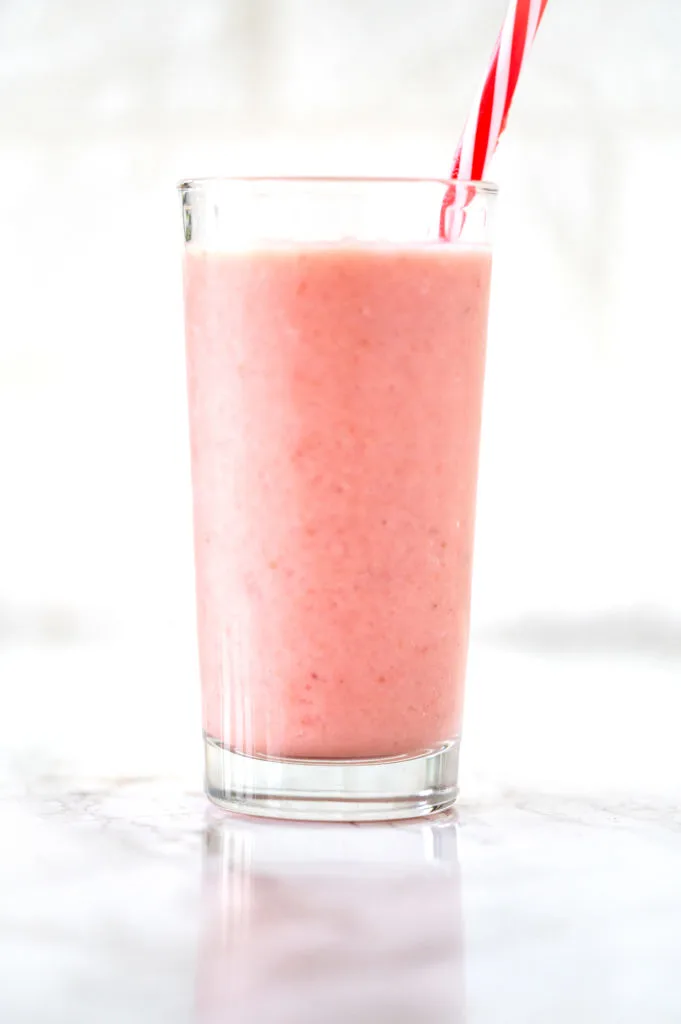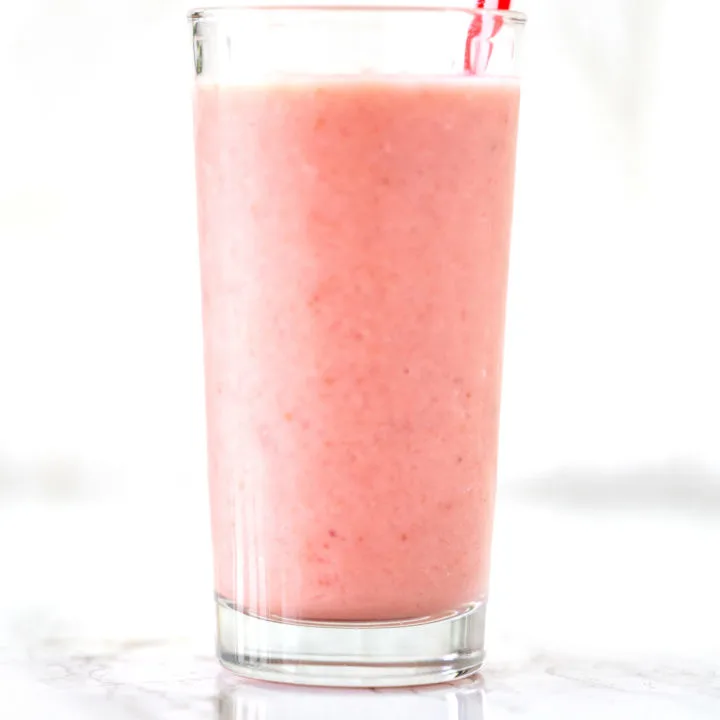This dairy free strawberry smoothie is made with oat milk. It has strawberries, but also melons to give it an incredibly fresh strawberry flavor which is perfect for hot summer days!

Oat milk has been my favorite dairy free milk since full fat oat milks that don't taste like oats have come out.
After that, I started making hot chocolate with oat milk and coffee with oat milk.
Then, I moved on to cold brew with oat milk and iced coffee with oat milk.
Now, I'm obsessed with smoothies with oat milk.
This strawberry smoothie with oat milk has a fresh strawberry flavor and is my favorite smoothie!
If you like this smoothie, you may want to try my strawberry banana smoothie with oat milk and my banana smoothie with oat milk.
WHY USE OVERRIPE BANANAS?
There are a few benefits to using overripe bananas.
First and foremost, older bananas give a stronger flavor than fresh bananas - the darker the better.
Secondly, it allows you to repurpose them instead of having food wasted.
Do Smoothies have Dairy?
Smoothies don't have to, but they usually contain dairy because they usually are made with milk and/or yogurt.
What you need for a smoothie is not necessarily milk, but actually a liquid. This means that all you have to do is switch the milk out for another liquid in order to make it dairy free.
Can I put oat milk in a smoothie?
Yes, you can use oat milk in a smoothie. Though, depending on how strong the oat flavor is in your milk, you may give your smoothie an oat flavor.
I generally recommend a fully fat neutral flavored oat milk if you're looking for something similar to regular milk.
Choosing your Brand
I have tried a handful of oat milk brands and I can tell you, not all oat milks are created equal.
Some brands taste like oats and have the consistency of water. Other brands have a milder taste and are slightly reminiscent of milk. Oatly and Alpro are my two go-to brands.
When I visit New York, I really like Oatly, which I find to taste like regular milk and to be a little extra creamy. I'd assume this is true in Canada too.
In Israel, I only use the barista version of Oatly, which is still more watery than the regular Oatly in the States. I expect it is the same in Europe because that is where it is imported from.
For Israel and Europe, I find the Alpro oat milk indistinguishable from the Oatly Barista. However, the Alpro "Not Milk" oat milk I find to be almost identical to milk but a little sweeter - which I like.
What Type of Dairy Free Yogurt Should I use?
You should use a neutral or vanilla flavored dairy free yogurt.
Yogurt made from soy, almonds, coconut, and oats all will work fine here.
Can I leave out the yogurt?
Yes, but the smoothie will be less creamy if you do. If you want to leave out the yogurt, replace it with more oat milk.
Sugar
The primary role of sugar is to be a sweetener. However, sugar also contributes to the tenderness and moistness of the baked good by absorbing and retaining moisture and helps create the golden brown color when baking as it caramelizes.
Recipes with more sugar often result in softer, moister textures. However, I learned the hard way that too much sugar leads to a sticky mess.
When it's heated, sugar caramelizes, resulting in a rich, complex flavor and a brown color. This adds both flavor and color to baked goods and is also the process in which caramel sauce, dulce de leche, caramel candies, and regular candies are made.
When used in recipes containing yeast, the sugar is eaten by the yeast, producing carbon dioxide and causing the dough to rise.
Sugar also acts as a preservative in jams, jellies, and fruit preserves by reducing water activity and preventing microbial growth.
There are many different types of sugar, including white sugar, brown sugar, vanilla sugar, powdered sugar, turbinado sugar, and demerara sugar.
When a recipe calls for “sugar” without specifying anything else, it's referring to regular white sugar.
White Sugar
White sugar (sometimes called granulated sugar, table sugar, or white granulated sugar) is made of either beet sugar or cane sugar, which has undergone a refining process.
It is the easiest to find and most commonly used.
Brown Sugar
Brown sugar is white sugar with molasses added to it.
It is commonly used in chocolate chip cookie recipes, and it’s rare for a recipe that calls for brown sugar not to also call for white sugar as well.
When a recipe calls for “brown sugar” but doesn’t specify what type (light or dark), it is referring to light brown sugar.
In my recipes, you can use whatever type of brown sugar you have on hand, whether it is dark brown sugar, light brown sugar, or demerara sugar - which is very common in Israel.
Just keep in mind that the flavor and color will be slightly different, depending on what you choose to use.
Turbinado Sugar
Turbinado sugar is better known as "raw sugar." But, despite this name, the sugar is not really “raw.”
Instead, it's partially refined sugar that retains some of the original molasses.
The term "raw sugar" may also give off the impression that it is somehow healthier.
In reality, turbinado sugar is nutritionally similar to white sugar.
Demerara Sugar
Demerara sugar is very popular in Israel and is especially delicious in tea, but is also used for baking.
Unlike white sugar, demerara sugar undergoes minimal processing and retains some vitamins and minerals.
However, it is still not much healthier than white sugar.
Vanilla Sugar
Vanilla sugar is not very common in the States. However, it is common in Israel and parts of Europe.
This is sugar that sat for an extended period of time with vanilla beans, giving it a vanilla flavor.
Caster Sugar
This type of sugar is common in the United Kingdom.
It has a grain finer than white (granulated) sugar and larger than powdered sugar.
Caster sugar is often called for in recipes for delicate baked goods like meringues, souffles, and sponge cakes.
You can use a 1:1 conversion rate between caster sugar and white (granulated) sugar.
Powdered sugar
Powdered sugar, sometimes known as confectioners’ sugar, is a sugar with a powdered texture.
This sugar is rarely used for baking. Instead, it is used for dusting desserts and making frosting, icing, and glazes.
In some countries, you can also find powdered vanilla sugar.
It is made the exact same way regular vanilla sugar is made. However, the sugar used is powdered instead of granulated.
Vanilla Extract vs Vanilla sugar
In my recipes, I don’t specify what kind of vanilla to use.
The reason for this is that in the States, vanilla extract is exclusively used.
Meanwhile in Israel, along with many European countries, vanilla sugar is common.
In most, if not all recipes, both vanilla extract and vanilla sugar can be used.
In recipes where vanilla sugar can be used instead of extract, you can replace them 1:1.
Replacing Sugar with Honey
If you’d prefer to use honey instead of sugar, you can do so with pretty good results.
Honey can be two or even three times as sweet depending on the honey, so for every 1 cup of sugar, you can use ½ to ⅔ cup honey.
Since honey adds liquid, you need to remove some to balance it out. For every cup of honey, remove a ¼ cup of liquid.
Also, it burns faster than granulated sugar, so you want to lower the baking temperature by 25 F. In addition, check it early and often to avoid burning or overbaking.
How to Store Sugar
Sugar should be stored in an airtight container to prevent clumping and moisture absorption, and kept in a cool, dry place.
HOW TO FREEZE FRUIT FOR SMOOTHIES
To make smoothies even easier, freeze fresh fruit into portions.
Cut fruit into pieces and arrange in one layer on a parchment paper-lined baking sheet.
Slide the baking sheet into the freezer and freeze until hard (two to three hours).
Smaller fruit, like berries, I often just freeze whole. It's easier to do this if you know how much you're going to need for a recipe and divide it up into bags.
Make Ahead of Time
You can easily make this recipe ahead of time.
All you have to do is put all the ingredients in the blender, except the milk (and oats, if desired).
Blend it up until it is nice and smooth. Then, pour the smoothie into a freezer safe resealable bag.
Once you're ready to use the smoothie, let it sit out until it's defrosted enough to put into the blender.
Place the smoothie in the blender, add the milk and oats, if desired, then blend until smooth again. Once it has a nice pourable consistency, put it in a cup, and serve.
Strawberry Smoothie with Oat Milk

This strawberry smoothie is made with oat milk. It has strawberries, but also melons to give it an incredibly fresh strawberry flavor which is perfect for hot summer days!
Ingredients
- 1 pound frozen watermelon
- 8 ounces frozen cantaloupe
- 4 ounces frozen strawberries
- 3 ounces frozen bananas
- ½ cup dairy free yogurt
- ½ cup oat milk
- ½ cup sugar
For a breakfast smoothie
- ½ cup rolled oats
Instructions
- Place watermelon, cantaloupe, strawberries, and bananas into the blender.
- Add dairy free yogurt, oat milk, sugar, and oats, if desired.
- Blend until smooth.
Nutrition Information:
Yield:
4Serving Size:
1Amount Per Serving: Calories: 257Total Fat: 2gSaturated Fat: 1gTrans Fat: 0gUnsaturated Fat: 1gCholesterol: 4mgSodium: 46mgCarbohydrates: 58gFiber: 3gSugar: 45gProtein: 5g